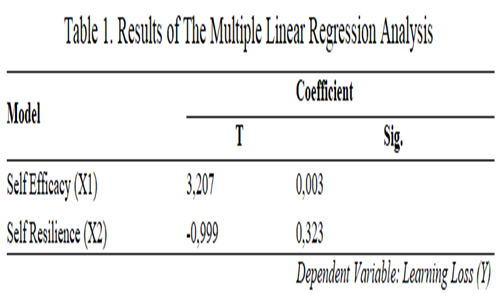
Survey of The Influence of Self Efficacy and Self Resilience to Biology Education Students to Overcoming Learning Loss
Abstract
Keywords
Full Text:
PDFReferences
Almaleki, D. A., Alhajaji, R. A., & Alharbi, M. A. (2021). Measuring Students Interaction in Distance Learning Through the Electronic Platform and Its Impact on Their Motivation to Learn During Covid 19 Crisis. International Journal of Computer Science and Network Security, 21(5), 98-112.
Bandura, A. (2003). Self Efficacy The Exercise of Control. New York: WH Freeman and Company
Chiu, T. K., & Lim, T. P. (2020). Strategic Use of Technology for Inclusive Education in Hongkong: A Content Level Perspective. ECNU Review of Education, 3(4), 715-734.
Daniels, L. M., Goegan, L. D., Parker, P. C. (2021). The Impact of COVID 19 Triggered Changes to Instruction and Assesment on University Students Self Reported Motivation, Engagement and Perceptions. Social Psychology of Education, 24(1), 299-318.
Dearlina, S., Nova, Y. S., Taridauli, S., & Yolanda, I. S. (2022). The Impact of COVID 19 Pandemic on Quality of Online Learning at HKBP Nommesen Medan University. Edutama Education Journal, 9(1), 33-39.
Fajhriani, D. (2020). Manajemen waktu belajar di perguruan tinggi pada masa pandemi covid-19. JIEMAN: Journal of Islamic Educational Magement, 1(3).
Fakhrurrozi, M., & Salim, F. (2020). Academic Self Efficacy and Resilience in Students. Psycology Journal, 16(2), 175-187.
Faradhillah., Izkar, H., & Nuraini, F. (2020). The Relationship of Self Efficacy Toward Students Achiement Index of Teacher Training and Education at Maliksaleh University. International Journal for Educational and Vocational Studies, 2(1), 139-143.
Habebci, M. T., Bertiz, Y., Alan, S. (2020). Investigation of Views of Students and Teachers on Distance Education Practice During the Corona Virus (COVID 19) Pandemic. International Journal of Technology in Education and Science 4(4), 267-282.
Irawan, A. W., Muslifar, R., & Dwisona, D. (2021). Poor college students’ resilience phase in online learning during the Covid-19 pandemic. Jurnal Kajian Bimbingan dan Konseling, 6(2), 52-59.
Kaffenberger. (2021.) Modelling The Long Run Learning Impact of The Covid 19 Learning Shock: Action to (More Than) Migate Loss. International Journal of Educational Development, 81(1), 1-8.
Munawaroh, E., & Nurmalasari, Y. (2021). Student resilience after pandemic: Learning loss recovery. Psikoeduko: Jurnal Psikologi Edukasi dan Konseling, 1(2), 1-10.
Pratiwi, W. D. (2021). Dynamics of Learning Loss: Teachers and Parents. Jurnal Edukasi Nonformal, 2(1), 147-153.
Risa, C. M., & Nani, S. (2021). The Effect of Student Resilience and Self Regulated Learning on Academic Achiement. Pedagonal: Journal of Scientific Education, 5(2), 62-69.
Schlesselman, L. S., Cain, J., & Divall, M. (2020). Improving and Restoring the Well-being and Resilience of Pharmacy Students During A Pandemic. American Journal of Pharmaceutical Education, 84(6), 677–682.
Sood, S., & Sharma, A. (2020). Resilience and Psychological Well-being of Higher Education Students during COVID-19: The Mediating Role of Perceived Distress. Journal of Health Management, 22(4), 606–617.
Sulastri, T., & Jufri, M. (2021). Resiliensi di masa pandemi: peran efikasi diri dan persepsi ancaman covid-19. Jurnal Penelitian Psikologi, 12(1), 25-32.
Sutrisno, E. (2010). Human Resources Management. Jakarta: Kencana Prenada Media Grup.
Tangkelangi, E. E., Megawati, R., & Akobiarek, M. (2021). Persepsi mahasiswa program studi pendidikan biologi dalam pembelajaran online pada masa pandemi covid-19. CELEBES BIODIVERSITAS: Jurnal Sains dan Pendidikan Biologi, 4(1), 25-32.
Yuzulia. (2021). The Challenge of Online Learning Learning During Pandemic: Students Voice. Wanastra: Journal of Bahasa dan Sastra, 13(1), 8-12.
DOI: http://dx.doi.org/10.31258/jes.8.2.p.239-246
Refbacks
- There are currently no refbacks.
Copyright (c) 2024 Surtika .

This work is licensed under a Creative Commons Attribution 4.0 International License.
Publisher: FKIP Universitas Riau












